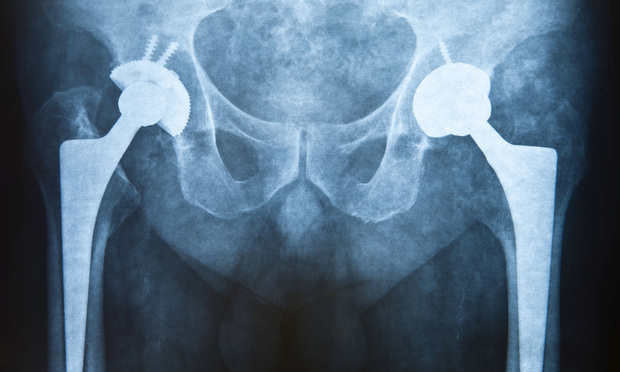3rd Circ.: Jury, Not Judge, Must Decide Whether Medical Device Lawsuit Was Timely
A federal appeals court has ruled in a precedential decision that the trial judge presiding over a woman's lawsuit against the maker of an allegedly defective hip implant that injured her should not have granted summary judgment against her on the basis that she filed her claims too late.
November 20, 2019 at 05:27 PM
4 minute read

A federal appeals court has ruled in a precedential decision that the trial judge presiding over a woman's lawsuit against the maker of an allegedly defective hip implant that injured her should not have granted summary judgment against her on the basis that she filed her claims too late.
The U.S. Court of Appeals for the Third Circuit on Wednesday reversed an Eastern District of Pennsylvania judge's grant of summary judgment in favor of device manufacturer Zimmer in plaintiff Marilyn Adams' case against the company, finding that the question of when the statute of limitations began to run is one a jury must answer.
The federal court's decision in Adams v. Zimmer came down within an hour of a pair of similar decisions issued by the Pennsylvania Supreme Court in Saksek v. Janssen and Winter v. Janssen. In those cases, the justices overturned a Superior Court ruling that tossed out lawsuits against drugmaker Janssen by two plaintiffs who alleged they developed excess breast tissue as a result of taking antipsychotic drug Risperdal. The high court said both the trial and appellate courts were wrong to dispose of the issue on summary judgment because it's for a jury to decide whether and when there was sufficient media coverage and medical literature detailing the possible link between Risperdal and excess breast tissue to alert the plaintiffs that they may have been injured.
Similarly, in Adams, the plaintiff alleged her Zimmer-made hip implant deteriorated and she was injured by shards that had fragmented from the whole. She filed suit in 2017, after the damage was confirmed during a 2015 surgery. The defendants argued she should have been on notice of her injuries beforehand, according to Third Circuit Judge Anthony Scirica's opinion.
"The central issue in this case is whether a jury could conclude Adams reasonably did not discover her injury until February 12, 2015, when Dr. [Prodromos] Ververeli apprised her of his intraoperative finding that her implant had deteriorated and emitted metal shards into her hip," Scirica said. "The district court concluded there can be no dispute that the information available to Adams in her preoperative visits would have put a reasonably diligent person on notice of her injury as a matter of law. In reviewing that determination at summary judgment we must 'view the record and draw inferences in a light most favorable to' Adams as 'the non-moving party.' Doing so, we cannot conclude that summary judgment was appropriate. As in the several Pennsylvania Supreme Court cases before this one, the question '[w]hether [a plaintiff] should have acted with greater diligence to investigate' or otherwise should have known of her injury earlier 'can only be seen as an issue of fact.'"
That question, therefore, is for a jury to address, Scirica said.
"While a jury may ultimately credit Zimmer's contention that Adams knew or should have known about her injury at some point before the February 2015 revision surgery, Adams has raised factual issues of notice and knowledge that Pennsylvania law requires a jury to resolve," Scirica said.
Adams is represented by Charles "Chip" Becker, Joe Osborne and Tom Kline of Kline & Specter. Becker and Kline also represent the plaintiffs in the Saksek and Winter cases.
In a statement, they said of the Adams ruling, "Today was an important day in Pennsylvania law concerning the discovery rule and the statute of limitations. The Third Circuit's decision in Adams rearticulates and aligns with long-standing Pennsylvania law as reflected in today's decision of the Pennsylvania Supreme Court applying the discovery rule in the context of Risperdal litigation. The reversal of summary judgment allows Ms. Adams' case to move toward trial. She looks forward to her day in court."
Zimmer is represented by Bruce G. Jones of Faegre Baker Daniels in Minneapolis, who did not respond to a request for comment.
This content has been archived. It is available through our partners, LexisNexis® and Bloomberg Law.
To view this content, please continue to their sites.
Not a Lexis Subscriber?
Subscribe Now
Not a Bloomberg Law Subscriber?
Subscribe Now
NOT FOR REPRINT
© 2025 ALM Global, LLC, All Rights Reserved. Request academic re-use from www.copyright.com. All other uses, submit a request to [email protected]. For more information visit Asset & Logo Licensing.
You Might Like
View All
Saul Ewing Loses Two Partners to Fox Rothschild, Marking Four Fla. Partner Exits in Last 13 Months
3 minute read


Feasting, Pledging, and Wagering, Philly Attorneys Prepare for Super Bowl
3 minute readTrending Stories
- 1Eliminating Judicial Exceptions: The Promise of the Patent Eligibility Restoration Act
- 2AI in Legal: Disruptive Potential and Practical Realities
- 3One Court’s Opinion on Successfully Bankruptcy Proofing a Borrower
- 4Making the Case for Workflow Automation
- 5Copyright Infringement by Generative AI Tools Under US and UK Law: Common Threads and Contrasting Approaches
Who Got The Work
J. Brugh Lower of Gibbons has entered an appearance for industrial equipment supplier Devco Corporation in a pending trademark infringement lawsuit. The suit, accusing the defendant of selling knock-off Graco products, was filed Dec. 18 in New Jersey District Court by Rivkin Radler on behalf of Graco Inc. and Graco Minnesota. The case, assigned to U.S. District Judge Zahid N. Quraishi, is 3:24-cv-11294, Graco Inc. et al v. Devco Corporation.
Who Got The Work
Rebecca Maller-Stein and Kent A. Yalowitz of Arnold & Porter Kaye Scholer have entered their appearances for Hanaco Venture Capital and its executives, Lior Prosor and David Frankel, in a pending securities lawsuit. The action, filed on Dec. 24 in New York Southern District Court by Zell, Aron & Co. on behalf of Goldeneye Advisors, accuses the defendants of negligently and fraudulently managing the plaintiff's $1 million investment. The case, assigned to U.S. District Judge Vernon S. Broderick, is 1:24-cv-09918, Goldeneye Advisors, LLC v. Hanaco Venture Capital, Ltd. et al.
Who Got The Work
Attorneys from A&O Shearman has stepped in as defense counsel for Toronto-Dominion Bank and other defendants in a pending securities class action. The suit, filed Dec. 11 in New York Southern District Court by Bleichmar Fonti & Auld, accuses the defendants of concealing the bank's 'pervasive' deficiencies in regards to its compliance with the Bank Secrecy Act and the quality of its anti-money laundering controls. The case, assigned to U.S. District Judge Arun Subramanian, is 1:24-cv-09445, Gonzalez v. The Toronto-Dominion Bank et al.
Who Got The Work
Crown Castle International, a Pennsylvania company providing shared communications infrastructure, has turned to Luke D. Wolf of Gordon Rees Scully Mansukhani to fend off a pending breach-of-contract lawsuit. The court action, filed Nov. 25 in Michigan Eastern District Court by Hooper Hathaway PC on behalf of The Town Residences LLC, accuses Crown Castle of failing to transfer approximately $30,000 in utility payments from T-Mobile in breach of a roof-top lease and assignment agreement. The case, assigned to U.S. District Judge Susan K. Declercq, is 2:24-cv-13131, The Town Residences LLC v. T-Mobile US, Inc. et al.
Who Got The Work
Wilfred P. Coronato and Daniel M. Schwartz of McCarter & English have stepped in as defense counsel to Electrolux Home Products Inc. in a pending product liability lawsuit. The court action, filed Nov. 26 in New York Eastern District Court by Poulos Lopiccolo PC and Nagel Rice LLP on behalf of David Stern, alleges that the defendant's refrigerators’ drawers and shelving repeatedly break and fall apart within months after purchase. The case, assigned to U.S. District Judge Joan M. Azrack, is 2:24-cv-08204, Stern v. Electrolux Home Products, Inc.
Featured Firms
Law Offices of Gary Martin Hays & Associates, P.C.
(470) 294-1674
Law Offices of Mark E. Salomone
(857) 444-6468
Smith & Hassler
(713) 739-1250





